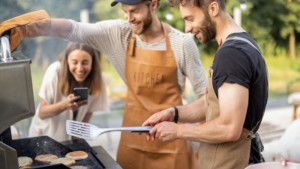 Few things are more American than firing up the grill during warmer months. But there’s more to grilling than fun and great food. Grilling saves energy. All the heat you’d normally generate with your oven and stove is dispersed outdoors instead, where it can’t interfere with your air conditioner or drive up your utility bill.
Few things are more American than firing up the grill during warmer months. But there’s more to grilling than fun and great food. Grilling saves energy. All the heat you’d normally generate with your oven and stove is dispersed outdoors instead, where it can’t interfere with your air conditioner or drive up your utility bill.
Lower energy costs leave more money for steak, hot dogs, and hamburgers ‒ all essential summer treats. However, to push your savings even further and enjoy the benefits of grilling, here are a few tips to make it even more cost-effective.
Switch to Gas
Propane and natural gas burn cleaner than charcoal. They reach the same temperature in less time using less fuel. Gas grills also give you precise control over cooking temperatures, so you don’t expend extra energy on food that doesn’t need it.
Gas grills release less smoke as well. Some people think this is a detriment, however, the smoky flavor doesn’t come from the charcoal, but the drippings. As the juices fall into the pan, they release oils, proteins, and sugars that get reabsorbed into the meat. Since this happens with both gas and charcoal, charcoal grills don’t offer any advantages you can’t get from a gas grill at a lower cost.
Prepare Your Food Before Lighting the Grill
Prepping your food while the grill warms up seems like a natural way to save money, but rarely is it. Grills heat up faster than you’d think, which means that you wind up wasting energy prepping your food. Always wash, clean, chop, and marinade ahead of time.
Keep Your Grill Closed
Grills are like ovens. They’re most effective when their heat’s concentrated. Opening your grill disperses the heat built up inside. By some estimates, cracking the lid adds an extra five minutes of cooking time. Much better to use a timer to tell you when to flip your food, rather than peeking in every few minutes to see how it’s doing.
Don’t Light Every Burner
Grilling relies primarily on direct, radiant heat. That means the only burners cooking your food are the ones directly below it. Lighting extra burners generate extra warmth but doesn’t make your food cook significantly faster or taste better.
Grill at the Right Temperature
Inexperienced grillers think the best way to cook is to crank the temperature as high as possible. A good strategy for some meats, but not all of them. Knowing how to adjust the heat, based on what you’re cooking, saves energy and gives food richer flavor. Here is a quick useful guide:
- Low Heat (225-250°F). Simmer ribs, pork shoulder, brisket, lamb, and goat at these temperatures.
- Medium Heat (325-350°F). Best for roasts, pork loin, whole fish, whole chickens, hamburgers, and large vegetables.
- High Heat (400-600°F). The ideal temperatures for steaks, pork chops, chicken breasts, and small vegetables. Heat to 650°F if you’re just looking for a good sear.
Grill in Large Batches
Like ovens, grills are most efficient when cooking large amounts of food, so try and fill up as much of the grill as possible whenever you cook. If there’s space left over after laying out your meal, add something you might want to eat for lunch tomorrow. Why fire up the grill twice when you could knock out two meals at once?
Turn Off Your Grill Right Away
Obviously, no one purposefully leaves their grill running all night. However, many people are so excited about the food they’ve prepared that they don’t think about shutting off the burners until everything’s been taken off and served up. Cooking this way doesn’t use up much energy, but if you’re grilling every week, it adds up. Your first move, when your food is done, should always be to shut off the burners before you take anything off the grill.
Clean Your Grill Regularly
Because they have to burn off the leftover fat, grease, sugar, and protein leftover from last time, dirty grills are inefficient. And the more build-up you have on your burners, the longer it takes for the grill to heat up and start cooking.
Make sure your energy goes into your food by cleaning your grill as soon as it’s cooled down. Use a wire brush to scrub away ash and food residue then mop the grates with a wet paper towel. Toothpicks will help you get at ash chunks in the burner holes. You can also wipe down the burners with soap and water, but make sure they dry completely before you fire up your grill again.